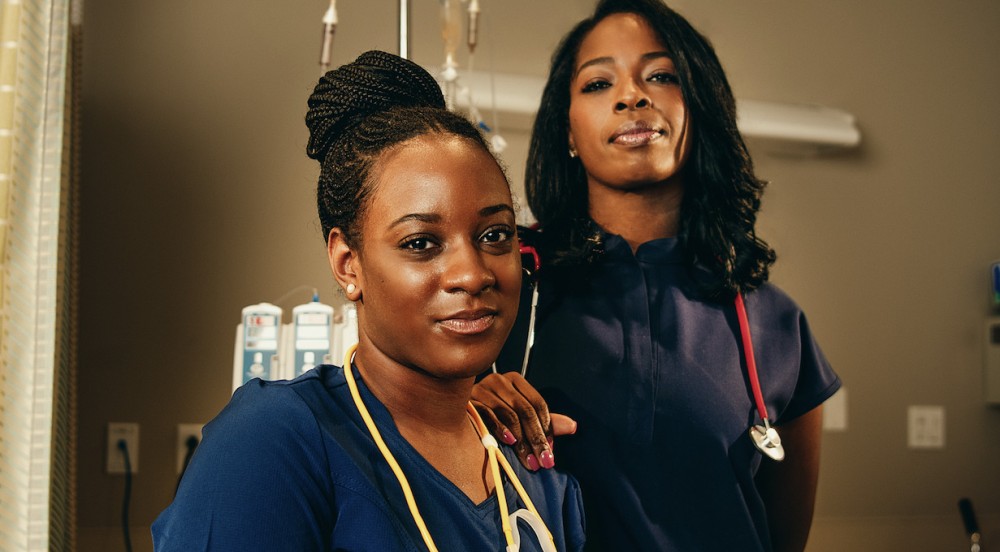In partnership with Clove healthcare shoes, the annual conference provided scholarships and employment opportunities.
Earlier this summer, the National Black Nurses Association (NBNA) held its 50th annual conference in Chicago, along with a free health fair for the local community. Founded in 1971, the non-profit organization was formed as a collective to represent and advocate for Black nurses, fighting unequal pay and systemic racist practices from employers, patients, and the American Nurses Association. Today, the organization continues to empower Black nurses, with over 100,000 members nationwide, and help them cope with the pressures, racism, and passion of working in medicine.
This year’s milestone conference was themed, "Bridging the Gap of Social Injustice and Health Disparities through Excellence in Nursing, Practice, Education and Research" and featured prominent speakers and guests in the health care industry. Sponsored by Clove, a brand of premium sneakers designed for healthcare professionals, an on-site career fair provided internships and scholarships for nursing students and opportunities in education, research, and health policy. In addition to the conference, Clove continuously donates proceeds and product to support the NBNA.
In conversation with EBONY, three incredible nurses from the organization discuss the significance of the NBNA and their mission of paving the way for future Black nurses.
Tiffany Gibson, MSN-ED, RN, NPD-BC, CPN

EBONY: How has the NBNA supported your role in healthcare?
Tiffany Gibson: As a Nurse Educator Consultant, the NBNA partners with me to highlight the trailblazers in nursing, promoting unconventional conversations in the nursing field with the goal to show that nurses can be leaders regardless of roles and titles.
How does the NBNA’s mission to reduce inequities in healthcare inspire you?
The NBNA provides a forum for collective action by African Americans to reduce inequities for people of color — as a Black woman in healthcare, I understand firsthand the importance of representation. My seat at the proverbial table means I speak and advocate for many as I challenge outdated nursing norms. I am reminded to use my gifts and position to do my part in closing the gap in healthcare inequities.
What does the future of nursing look like?
It looks like a workforce of emotionally intelligent nurses who take into account the psychological aspects of what it takes to be a nurse, how to lead and advocate, and to prioritize self-care, personal agency, and integrity.
Darnell Caldwell, BSN, RN

EBONY: What does the future of nursing look like to you?
Darnell Caldwell: It looks like a nurse in the boardroom and making policies for the people. Nurses live and work at the interchange of health, education, and communities — our roles have expanded to meet an increased demand for care. We’ll need to work towards a more diversified workforce that is equipped to provide care to disadvantaged communities.
How has the NBNA supported your role as a nurse?
The NBNA has supported my student nursing career for 10 years. From scholarships and serving as a board member to meeting mentors across the country, I have access to nursing leaders who have broken barriers on all levels of my profession. The NBNA has exceeded my expectations of what nurses can be.
With a goal to reduce inequities in health care, how does the NBNA’s mission inspire you?
At my current hospital, one of my roles is serving as Community Health Mobile Team Supervisor — my goal is to promote accessibility by meeting the people where they are. We visit schools, nursing facilities, apartment complexes, and more to ensure access is being provided to all New Orleans residents. This uplifts NBNA’s mission to represent and advocate for the highest quality of healthcare for persons of color.
Ardenia Norris, Student Representative

EBONY: How has the NBNA supported your healthcare journey?
Ardenia Norris: I discovered the NBNA through my local chapter’s president. I quickly joined the program and gained a mentor who has invested in me since the beginning of my journey to becoming a nurse. The journey hasn’t been easy, but my local chapter supported me through opportunities to give back to the community, helping other students, and roles in leadership — I joined the board of directors as a student representative to advocate for other students in the NBNA.
How does the NBNA’s mission to reduce inequities in healthcare inspire you?
Throughout my clinical experience, I’ve noticed that patients aren’t equipped with ways to prevent readmission to the hospital. Because education is a major key in helping patients understand the disease process and reducing rates of mortality, I plan to promote inclusivity and ensure understanding is established with my patients and their families.
What does the future of nursing look like to you?
Mentors and nursing educators help students reach their highest potential. By investing into the younger generation of nurses, more people can find success in their nursing career and continue to give back to the community.













